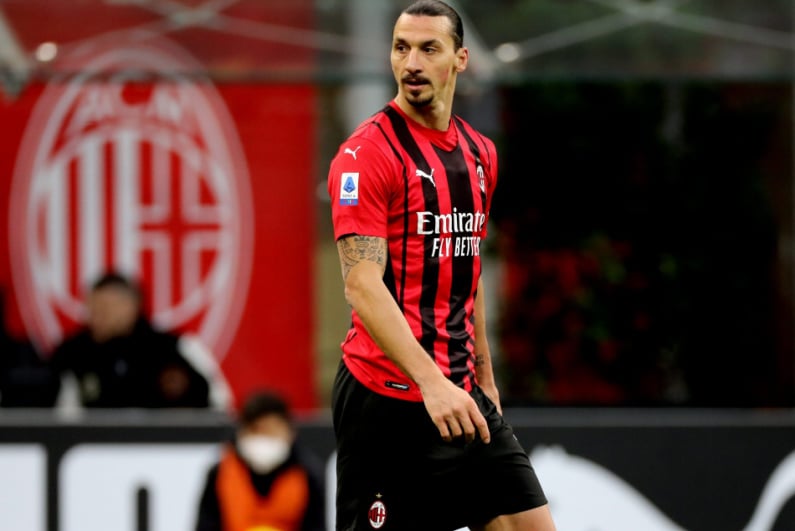Zlatan Ibrahimovic bids farewell
The best athletes are often described as being larger than life, heroic, or even mythical,
but Zlatan Ibrahimovic bears the honorable distinction of being compared to God himself.
The 41-year-old Swedish striker stepped away from the beautiful game earlier this week, marking the end of one of the most memorable sports careers ever. Whether it be his braggadocious remarks, unflappable arrogance, or extravagant antics, Ibrahimovic will go down as nothing short of a legend.
This is the story of Zlatan Ibrahimovic: the most charismatic soccer player ever.
Zlatan Ibrahimovic’s childhood
Ibrahimovic was born in Malmö, Sweden in October 1981 to a Bosnian father and Croatian mother. He began playing soccer at six years old after he received a pair of cleats as a present, which officially started his career in the sport.
But as is the case with many successful athletes, Ibrahimovic had anything but a picture-perfect upbringing. He lived with his mother until he was nine years old, but repeated abuse, including the breaking of wooden spoons over his head, and her inability to parent a house of five children forced children’s protective services to get involved.
“Ibra,” as he is commonly known, was sent to live with his father shortly thereafter, but his situation did not get any better. His father struggled for money and was an alcoholic that spent most of his income on beer and often did not have enough food to feed his son dinner.
I need to be angry to play well.”
Around that time, the young Swede fell into a life of crime. He stole bikes and shoplifted from various stores to get the food, money, and basic goods that his parents did not provide. That “do-or-die” mentality ended up defining his playing career, as he later admitted during an interview that “I need to be angry to play well.”
By the time he was 15, Ibra was considering hanging up his jersey to find a stable income and work at the docks in Malmö. Only a conversation with his manager convinced him to keep grafting on the pitch instead of by the sea.
Career progression
At 17, Ibrahimovic was offered a tryout by Arsène Wenger, manager of Arsenal. But rather than accept what would have been the biggest break of his career and a chance to join one of Europe’s most competitive leagues, he declined the opportunity.
His reasoning: “Zlatan doesn’t do auditions.”
He ended up joining Dutch side Ajax in 2001, which is where he announced his arrival to the world. During a match against NAC Breda, he scored one of the most skillful goals of all time, a solo run where he beat five defenders and slotted the ball into the back of the net. He wound up with 35 goals in 74 matches at Ajax and earned a move to Juventus in 2004 before going on to play for many of the continent’s top sides.
Ibra is best remembered for his time at AC Milan, but he also played for Inter Milan, Barcelona, Paris Saint-Germain, Manchester United, and LA Galaxy, where he racked up 637 combined appearances.
He was also capped by the Swedish national team 122 times during his career. Here, during an international friendly against England, he scored another one of the most iconic goals ever, a 30-yard volleyed bicycle kick in the 91st minute.
That was Zlatan’s fourth of his side’s four goals in the game and was so good that it won the Puskas Award for the best goal of the year.
Ibra sits 14th on the all-time goal-scoring list for club and country with 561 goals, which means he scored roughly .74 goals in every match he played—a truly elite return. But his overwhelming power and precision on the pitch are just one side of what makes him such an icon in the sport.
Let’s dive into Zlatan the character.
Controversies and quotes
In a press conference, a reporter asked Ibrahimovic why he had so many scars on his face. His response? “I don’t know. You’ll have to ask your wife.”
In 2004 and while under contract at Ajax, Zlatan’s Sweden was playing the Netherlands, of which Ajax’s captain, Rafael van de Vaart, was a featured member. Zlatan tackled the latter very aggressively during the flow of play and ended up scoring in the aftermath, but tore his captain’s ankle ligament in the process.
would break both of his legs and that it would be on purpose
van de Vaart insisted the tackle was a deliberate move to injure him and did not waver from that belief. Ibra told him that it was truly an accident, but if he kept it up he would break both of his legs and that it would be on purpose.
He’s also punched, slapped, and kicked opponents, and even teammates, but that’s not unprecedented enough. Not for Zlatan.
While playing for Barcelona, he had a well-publicized row with manager Pep Guardiola, who many now consider the best coach in world soccer. But Ibrahimovic had a different understanding of his then-boss.
“When you buy me, you are buying a Ferrari. If you drive a Ferrari you put premium petrol in the tank, you hit the motorway and you step on the gas. Guardiola filled up with diesel and took a spin in the countryside. He should have bought a Fiat.”
Controversies and quotes part two
During his stint at PSG, Zlatan told a referee he was a “f*****g a*****e” and then declared that France was a “s**t country.”
The comments infuriated so many locals that the leader of France’s right-wing political party told Zlatan he was free to leave the country. The French sports minister also encouraged him to apologize, which he did, and said that he was only taking exception to the referees in Ligue 1.
Ibrahimovic also drew the ire of many when he made disparaging comments about women’s sports.
“With all respect for what the ladies have done, and they’ve done it fantastically well, you can’t compare men’s and women’s [soccer].”
“When I come out in Europe, they compare me to Messi and Ronaldo. When I come home, they compare me to a female player. With all respect for the ladies, they should be rewarded in relation to what they generate.”
On a more humorous (and self-centered) note, after hearing of his move to Manchester United former striker Eric Cantona said that he would be the prince of Manchester. Zlatan responded as you’d expect him to: “I won’t be the king of Manchester. I will be the God of Manchester.”
Before arriving in England, he also said that he “Couldn’t help but laugh at how perfect [he was].”
Always true to himself, Zlatan went out with a bang. During his retirement speech before AC Milan’s final game against Hellas Verona, a crowd of traveling supporters began booing. Zlatan told them: “Keep booing—this is the biggest moment in your year seeing me.”
Zlatan Ibrahimovic was very much a love-him-or-hate-him player, but nobody in the sport delivers the same quotes or storylines that he did. His presence will be deeply missed.




